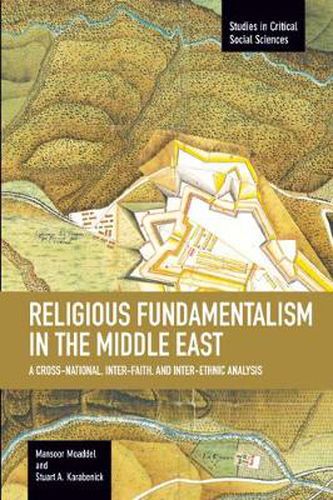Readings Newsletter
Become a Readings Member to make your shopping experience even easier.
Sign in or sign up for free!
You’re not far away from qualifying for FREE standard shipping within Australia
You’ve qualified for FREE standard shipping within Australia
The cart is loading…






In Religious Fundamentalism in the Middle East, Moaddel and Karabenick analyze fundamentalist beliefs and attitudes across nations (Egypt, Iran, Lebanon, and Saudi Arabia), faith (Christianity and Islam), and ethnicity (Azari-Turks, Kurds, and Persians among Iranians), using comparative survey data. For them, fundamentalism is not just a set of religious beliefs. It is rather a set of beliefs about and attitudes toward whatever religious beliefs one has. In this analysis, the authors show that fundamentalist beliefs and attitudes vary across national contexts and individual characteristics, and predict people’s orientation toward the same set of historical issues that were the concerns of fundamentalist intellectual leaders and activists. The authors’ analysis reveals a cycle of spirituality that reinforces the critical importance of taking historical and cultural contexts into consideration to understand the role of religious fundamentalism in contemporary Middle Eastern societies.
$9.00 standard shipping within Australia
FREE standard shipping within Australia for orders over $100.00
Express & International shipping calculated at checkout
In Religious Fundamentalism in the Middle East, Moaddel and Karabenick analyze fundamentalist beliefs and attitudes across nations (Egypt, Iran, Lebanon, and Saudi Arabia), faith (Christianity and Islam), and ethnicity (Azari-Turks, Kurds, and Persians among Iranians), using comparative survey data. For them, fundamentalism is not just a set of religious beliefs. It is rather a set of beliefs about and attitudes toward whatever religious beliefs one has. In this analysis, the authors show that fundamentalist beliefs and attitudes vary across national contexts and individual characteristics, and predict people’s orientation toward the same set of historical issues that were the concerns of fundamentalist intellectual leaders and activists. The authors’ analysis reveals a cycle of spirituality that reinforces the critical importance of taking historical and cultural contexts into consideration to understand the role of religious fundamentalism in contemporary Middle Eastern societies.